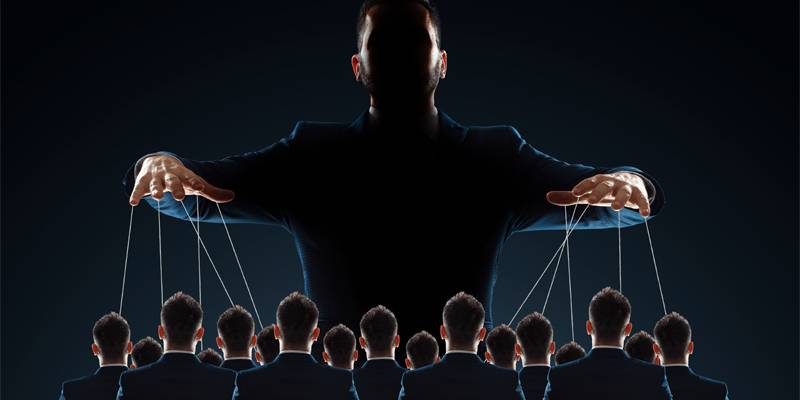What is gaslighting: how to identify if you are a victim?

You are inside a room, facing a sofa. You can see the sofa and three cushions on it. You stand up and walk wearily towards it. You extend your hand, touching its surface ever so slightly and feeling its soft bristles on your hand. But the person standing behind you is constantly telling you the sofa does not exist or the sofa has no cushions on it. The person repeats that what you think you see is false and they are correct when they say the sofa does not exist. When you try to take their hand towards the sofa, they snap out of your grip and start shouting at you. Your head begins to throb every time their voice goes up. The person then points towards an empty corner and says, “The sofa is kept there!” As much as you want not to believe what they say, their voice is slowly gaining more power over your voice. You start doubting yourself: ‘Maybe, the sofa is not where I saw it. Maybe the sofa is not where I felt it’.
As a persistent form of manipulation, gaslighting is a form of brainwashing that is carried over a timeline of experiences where the gaslightee starts questioning their sense of perception. The relationship between the gaslighter and the gaslightee is power-driven where the former is focusing on taking advantage of the latter through a shift in control. Seeds of doubt are repeatedly planted in the ground of a person’s experience. You and the reality you hold around a shared experience becomes confusing. The ripple of the wave touches all possible experiences you will later hold in the future. Doubts root and break the foundation of authenticity you carry. The gaslighter may resort to emotional or physical aggression towards you. You end up doing the gaslighter’s job: make your experiences invalid by doubting them.
Are you being gaslighted?
In times when experiences and perceptions can easily be distorted, an individual can be exposed to gaslighting experiences in both their professional and personal lives. So how can we become more aware if we are on the receiving end of this?
“Am I being too sensitive?”
The gaslighter may try to speak gaslightee’s experiences on their behalf. Instead of listening to you, they will force their version of your behaviour by telling you what you said or did in a particular context. They are motivated to twist your memories and words against you for their own benefit. You are placed in a position where you end up second-guessing your lived experiences. Self-doubt grows around your emotional responses since the gaslighter is actively working to invalidate your version of the story. They can use mocking tones, emphasising that something is wrong with you.
“Am I being forgetful?”
When the gaslighter is constantly repeating their version of the story/experience, they are secluding you from any healthy control you can have on the conflict. You are placed in a position of utmost confusion where you may start seeing lapses or slip-ups in your memories even if they were not there,
to begin with. The wave of hopelessness hits every time you try to voice your story. The gaslighter can also lose their temper when you challenge them.
When you are placed in a position where you are directly (and aggressively) blamed for the wrongdoings happening to them, you are compelled to rectify that by apologising. The moment we start doubting our memories, we lose our centre of control and our mind is driven towards a state of anxiety.
We start mistrusting ourselves, more bit by bit, than mistrusting the words of the gaslighter.
“Maybe I am to be blamed for this.”
They will also discard any factual information you provide and choose to accuse you with their own set of beliefs. They either choose not to acknowledge their errors or only a portion of it while placing the entire burden of the blame on you. After conveying their response to the situation, they wall themselves up and do not provide you with an opportunity to communicate.
In very clear words, they might tell you that they do not want to hear anything on this, they will not discuss it again and if you talk about it, there will be dire consequences attached to it. However, when tables are turned and you do not entertain their attacks, you fall in the middle of an emotional outburst from their end. Always wanting to have the upper hand in an argument, you are then deprived of any space to voice your own opinions. Identify these red flags as soon as possible, otherwise, you might end up being in a toxic relationship that does more harm than good. Controlling behaviour, not being transparent, and always emphasising on self are some of the signs.
“Do our friends think I am bad?”
If you have a shared circle of friends and family, they will also try to feed false information about you. Many times, the shared social circle is unaware of the experiences a gaslightee goes through. You start feeling isolated when others unknowingly become enablers of the gaslighter. It feels like everyone is turning against you since your gaslighter is actively working on portraying you in a bad light.
Often, the gaslighter also tries to convince you with the lie that everyone thinks you are to be blamed for the failure of a personal relationship.
Such active social dominance might create a deeper sense of loss of control over the situation. In a way, they groom you to doubt yourself, which diminishes your confidence and makes you question everything.
“Am I doing everything to make sure they are happy?”
Slowly, you start getting worn out by the constant challenges placed on your mental and emotional health by the gaslighter. Instead of validating your own experiences, you start validating the gaslighter’s story and are discouraged to voice opinions different from theirs. A sense of fear is installed every time you see a change in your gaslighter’s mood; you are too tired to fight back.
Keeping them happy also means keeping your shared social circle attached. Result? Feelings of incompetence and inadequacy are heightened.
You continue pleasing the gaslighter and accept their form of control and regulations in your life. Since your sense of security and control is constantly corroded by the gaslighter, you start feeling that you are always wrong and any effort made by you is not enough.
This cycle of thinking is called ‘learned helplessness’ where intense feelings of helplessness and hopelessness surface due to lack of control. Since you feel you do not have any control over the experience, you tend to accept things as they are. You start depending on the gaslighter’s reality because your only sense of control is coming from it.
“Maybe things are getting better!”
When a person is in a state of utter confusion, any positive response from the gaslighter seems to hold much more value. The gaslighter can provide false hope by extending respect, kindness and love to the gaslightee in very limited circumstances. Promises of taking better care of the relationship are mostly left incomplete. This tactic creates a false sense of incoming stability and security in the mind of the gaslightee. By keeping a balance between constant manipulation and false hope, the gaslighter can engage you enough to continue their dominance and control over your life.
Gaslighting is not just an act of lying over time. It is a continued assault on an individual’s sense of security, stability and self-worth by making them feel unsure of their reality. The metaphor of a sofa used earlier is simply a beginning of unnerving grooming that the gaslightee goes through. Becoming aware of the markers is the first step towards breaking the power-driven cycle by the gaslighter.






